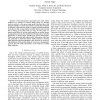Free Online Productivity Tools
i2Speak
i2Symbol
i2OCR
iTex2Img
iWeb2Print
iWeb2Shot
i2Type
iPdf2Split
iPdf2Merge
i2Bopomofo
i2Arabic
i2Style
i2Image
i2PDF
iLatex2Rtf
Sci2ools
121
click to vote
BROADNETS
2007
IEEE
2007
IEEE
Reconsidering power management
— Power-management approaches have been widely studied in an attempt to conserve idling energy by allowing nodes to switch to a low-power sleep mode. However, due to the inherent inability of current approaches to match sleep schedules to different traffic patterns, energy is wasted switching needlessly from sleep to idle or large delays in traffic delivery are incurred due to being in the sleep state too long. In this paper, we explore such effects of various traffic patterns on current power management protocols. Our results show the importance of traffic information to obtain larger benefits from power management. While some proposals that exploit traffic information exist, they rely primarily on individual sender traffic patterns to develop sleep schedules, ignoring aggregate traffic observed by receivers. This deficiency motivates the design of a new power management protocol that use traffic information at the receivers to adapt sleep schedules.
Related Content
| Added | 02 Jun 2010 |
| Updated | 02 Jun 2010 |
| Type | Conference |
| Year | 2007 |
| Where | BROADNETS |
| Authors | Cigdem Sengul, Albert F. Harris III, Robin Kravets |
Comments (0)

